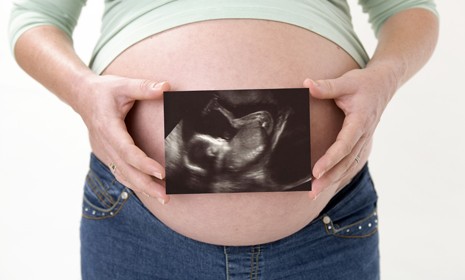Can stress determine your baby's gender?
A new study suggests that chronically anxious moms may be more likely to have daughters than sons

A free daily email with the biggest news stories of the day – and the best features from TheWeek.com
You are now subscribed
Your newsletter sign-up was successful
Attention, expectant moms. If you want a son, try relaxing. If you have your heart set on a daughter, go ahead and sweat the small stuff. That's because a new study by British and American researchers found that pregnant women suffering from high, chronic stress levels are far more likely to have baby girls. Here, a brief guide:
How did researchers link stress to babies' gender?
They asked 338 British women to keep diaries and fill out questionnaires about stresses they were feeling — at work, at home, and in the bedroom. The researchers also measured the women's levels of cortisol — a hormone linked to long-term stress over health, work, and money — and the enzyme alpha-amylase, which may be prevalent after an argument or some other source of short-term stress. Then, 130 of the women got pregnant, and the researchers found a link between their relative stress levels and the gender of their babies.
The Week
Escape your echo chamber. Get the facts behind the news, plus analysis from multiple perspectives.

Sign up for The Week's Free Newsletters
From our morning news briefing to a weekly Good News Newsletter, get the best of The Week delivered directly to your inbox.
From our morning news briefing to a weekly Good News Newsletter, get the best of The Week delivered directly to your inbox.
And stressed moms were more likely to have girls?
The mothers in the study had 58 boys and 72 girls. Normally, 105 boys are born for every 100 girls in Western countries. The 50 percent of women in the study with the highest cortisol levels — the hormone linked to long-term stress — were 75 percent less likely to have sons. Those with the next highest cortisol levels were 69 percent less likely to have sons. A baby's gender is determined by chromosomes in the father's sperm, says Emma Hartfield at Mumstreet, so perhaps cortisol affects how likely male and female embryos are to implant in the womb.
Were the researchers surprised?
It didn't come as a complete shock. "We have known for a long time that some environmental factors, such as war, natural disasters, and also occupation can affect the sex ratio at birth," says fertility expert Dr Allan Pacey of Britain's University of Sheffield, as quoted by The Press Association. But this is the first study — and a small one at that — to make the connection, and more research will be needed to nail it down. "It is important to caution couples that there is no surefire way to influence the sex of their baby," says Pacey, as quoted in Britain's Telegraph. "In my view, couples should just be happy with the sex of baby they get."
A free daily email with the biggest news stories of the day – and the best features from TheWeek.com
Sources: Made for Mums, Press Association, Telegraph, Mumstreet